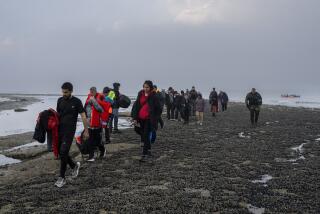Market Focus : Squeeze Play : Saddam Hussein pressures Iraq’s Kurdish minority by undercutting their currency.
- Share via
IRBIL, Iraq — Wanted, urgently: economist, of sound mind and sounder stomach, military background and knowledge of Kurdish an advantage, previous experience probably inapplicable, remuneration practically impossible.
Without the aid of such a financial wizard, the 3 1/2 million Kurds of northern Iraq wonder how they can get out of a unique economic bind in which they have been trapped by the wily Iraqi dictator, Saddam Hussein. Blocked by Western military guarantees from continuing his 1980s torture, chemical bombing and massacres of this ethnic minority, he seems about to take away the little that remains of their currency.
In a form of economic warfare, Hussein in May canceled the main prewar high-denomination note, the 25-dinar bill, rendering it worthless. To drive home the point, he appeared on Iraqi television and burned a note.
Kurdish officials believe it is just a question of time before Hussein will cancel the rest of the prewar notes, causing economic chaos in the semiautonomous Iraqi region of Kurdistan, where the Kurds live.
The Kurds are especially vulnerable because, unlike Iraqis in Baghdad-controlled areas, they depend on the old Swiss-printed notes for trade over their traditional smuggling routes to Turkey, Iran and Syria--trade that keeps their economy alive. In the rest of Iraq, a parallel currency, printed so cheaply the Iraqi Kurds call it “photocopy currency,” circulates; it is not accepted abroad and is spurned in Kurdish-controlled areas.
Hussein’s burning of the 25-dinar note produced a foretaste of what may come. Pandemonium struck in the Kurdish north. The dollar rate started to swing wildly between 30 and 90 dinars, depending on the hour of the day and the type of dinar. The old Swiss five- and 10-dinar notes were still valid, but clearly not trustworthy, and they’re literally falling apart after three years of circulation with no replacements. Some shops even reconstruct worn-out notes for a fee, patching them together with tape.
People have rushed to buy anything they can find to store value--cars, food, gold, foreign currency. The price of the simplest thing has become indexed to the dollar rate. Right now, a sheep costs five months of a civil servant’s 300-dinar-a-month salary. But it will probably be more tomorrow.
Some middle-class, fixed-income Kurdish families have so depleted their reserves that they have sold off all possessions, including internal house doors.
“Nobody’s got much worth buying any more,” said an antique dealer in Irbil, the capital of Iraqi Kurdistan. He spoke among shelves of old tea sets, Russian samovars and worn carpets.
And nobody knows what to do about the economic dilemma.
“We will appeal to the United Nations. They have to do something. They have to give us some of the Iraqi money in the frozen funds,” insists Abdulla Rassoul, a fierce-looking guerrilla commander appointed in April to be “prime minister” of the rebel-held Kurdish north.
“A foreign bank must be opened. We must have support. As they give us support militarily, they must do so economically. The economic pressure is worse than the military one.”
But the West is unlikely to do anything of the kind. It is concentrating on a protective military umbrella in place since the collapse of the Kurdish revolt after the Persian Gulf War in 1991, a hangover mission whose initial aim was only to relieve the much-televised misery of the refugee crisis as Kurds fled to the mountains of Iran and Turkey.
“We want to help this people achieve a level of normalcy so that they feel secure in person and property. What they do next is up to them,” said U.S. Army Col. Gerald Thompson, chief of the small Western military mission still on the ground in northern Iraq, which notes few signs of an imminent Iraqi offensive.
The West’s limited view angers Kurds such as Hero Talabani, member of the increasingly effective new Iraqi Kurdistan Parliament and wife of guerrilla leader Jalal Talabani.
“The West does not want us to be stronger, but it doesn’t want us to die. They just want us to stay the same until they find a solution for Saddam Hussein,” she said. “Western media is back to indifference. Why don’t they realize that they can do something now for a low cost, a fraction of what they will spend if the people flee again?”
The crux of the indecision is a political question about Kurdistan. Some in the West may feel there is no good reason why the Kurds should not have their own nation if they want it, at least in democratic-enough northern Iraq. But there are more than 20 million ethnic Kurds in the Middle East. The fact that other big, neighboring Kurdish minorities are violently fighting for rights means nobody dares to offend the Iranian, Turkish and Arab worlds all at once by allowing an independent Kurdistan to happen.
Meanwhile, the Kurdistan administration in Iraq manages to pay pitifully small salaries from customs revenue it gathers through its control of the main road between Turkey and Iraq. But it does not officially exist as an agency of Iraq and is prevented from exploiting its few resources by a double blockade: international sanctions against Iraq as well as slow strangulation from Baghdad.
“We are ready for responsibility, but we are not recognized, we are under two blockades. The problems are almost all economic,” said Barzan Khaled, the deputy minister of culture. “Most of the people are asking for bread, but we don’t have it. That’s in the hands of America and the United Nations.”
More to Read
Sign up for Essential California
The most important California stories and recommendations in your inbox every morning.
You may occasionally receive promotional content from the Los Angeles Times.










